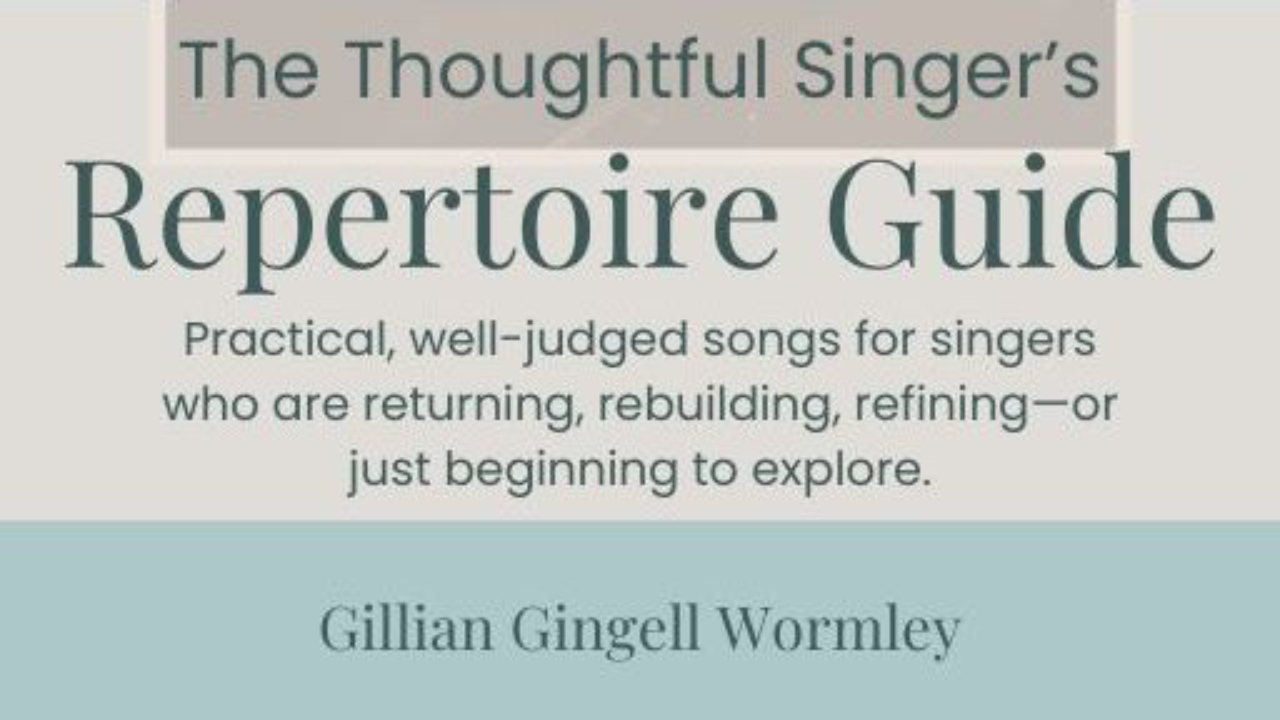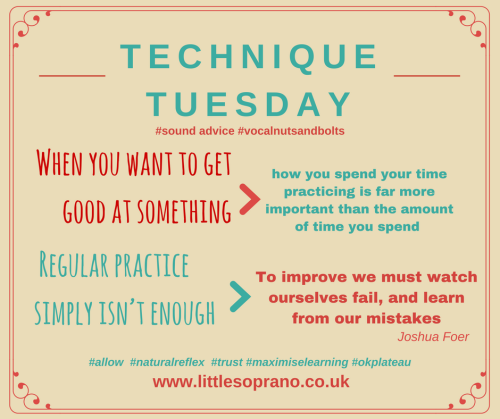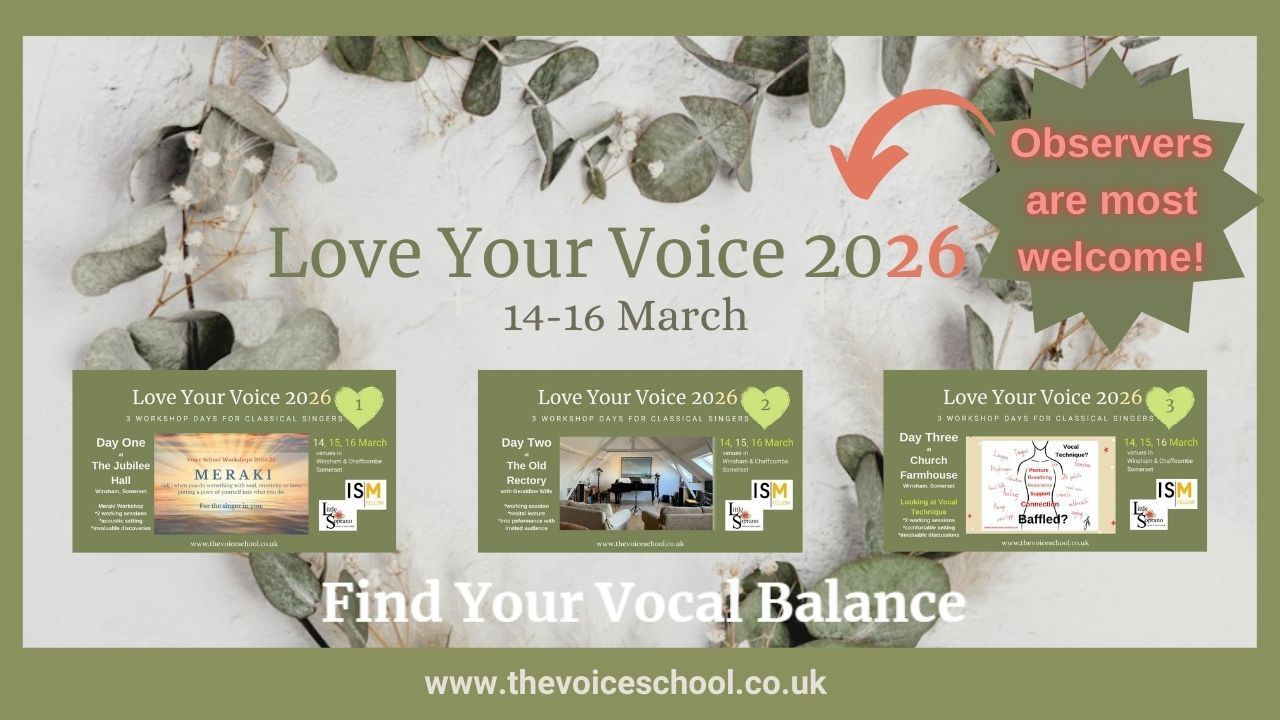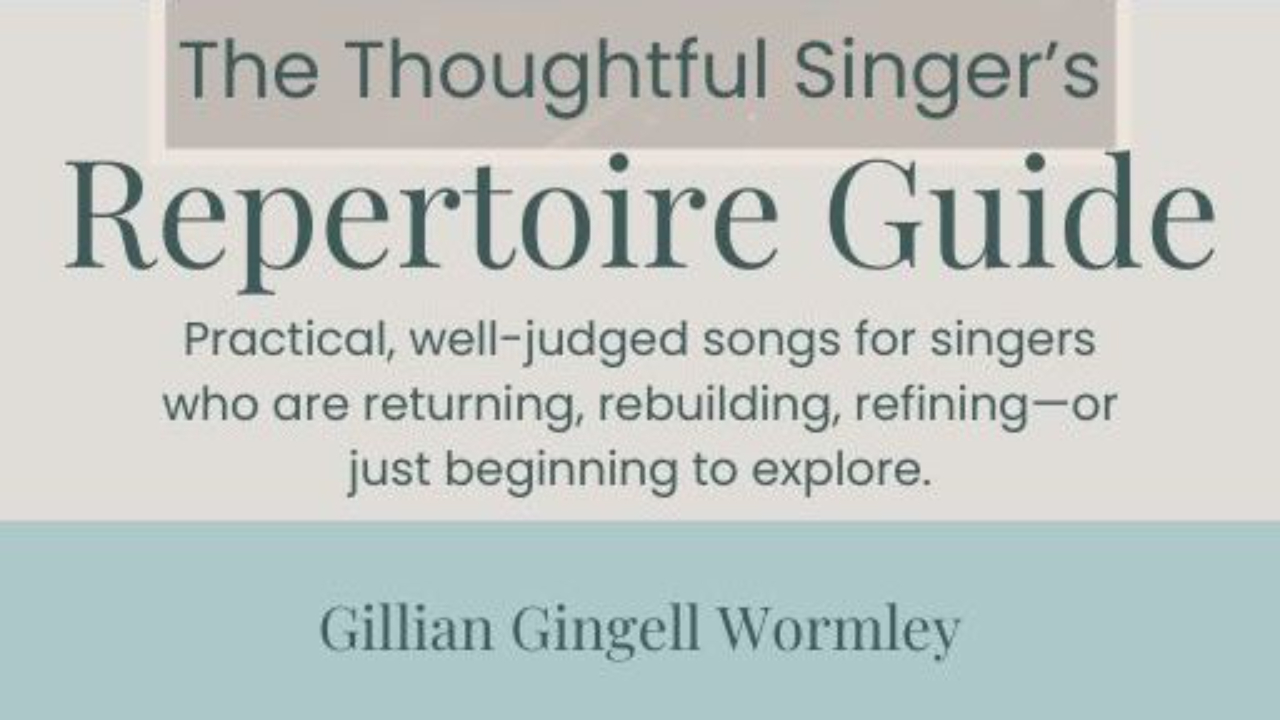Your singing: planning the year ahead.

For many singers, January and February are not a time of instant momentum.
After Christmas, routines have shifted, energy feels steadier rather than expansive, and singing can feel slightly unfamiliar. This is normal. The voice hasn’t gone anywhere, but it may need time to re-settle after weeks of different rhythms, sleep patterns, and demands. Expecting to feel immediately “back” often creates unnecessary pressure, particularly in mid-winter.
One of the most common difficulties at this point in the year is the temptation to rush. Singers can feel they ought to be back where they were in the autumn, as though continuity were something that could be switched on again at will. In reality, returning to singing works far better when it is approached as a process of re-orientation rather than recovery; listening first, noticing what is present now, and allowing habits to re-form without strain.
This early part of the year often lends itself to preparation. That may mean choosing repertoi...
Mozart: exacting, rewarding, and full of wit.

Why Mozart’s music demands your attention
In Mozart’s Vienna, wit meant more than humour. It was a sign of mental agility, the ability to turn an idea with elegance, to surprise with precision, to reveal something human through restraint. Mozart carried that quality everywhere: in the sparkle of his comic operas, in the stillness of his sacred music, and in the subtle craftsmanship of every phrase. He was playful, yes, but never without purpose — and that spirit is at the heart of Sing Joyfully 2025 in Chandler’s Ford, Hampshire, UK.

The joy and challenge of singing Mozart
That playfulness can mask just how exacting his writing is. In Prenderò quel brunettino, the duet for Fiordiligi and Dorabella in Così fan tutte, the singers must match tone, timing, articulation, and breath as if they were one voice, while also staying true to their characters, who are complete opposites. Fiordiligi is upright, idealistic and careful; Dorabella is impulsive, easily swayed, and mischievous. In p...
Back to Winsham Because They Asked

We’re heading back to Winsham in Somerset this September — not simply because it’s a beautiful village with the marvellous acoustics of The Jubilee Hall, but because, quite frankly, they asked. After Love Your Voice in March, several locals and friends of The Voice School quietly inquired, “When will you be back?” It’s always a lovely sign when the question arrives before the invitation is extended.
So here we are, returning on the weekend of Saturday 13th and Sunday 14th September, offering two distinct and artistically valuable experiences for classical singers who are ready to return to their voice with intention. These two days are independent of one another — you may attend either or both — but together they form a meaningful beginning to the new academic year ahead.
Two Days, Two Invitations
Each day holds its own energy and purpose.
On Saturday, 13th September, we begin with The Vocal Refresh. This is a quietly focused day for a small group of classical singers to work in de...
Songs That Fit: A Repertoire Guide for the Thoughtful Singer

If you are an adult classical singer looking for repertoire that truly fits, whether you are returning after a break, actively studying, or simply wanting fresh ideas that make sense for your voice now, The Thoughtful Singer’s Repertoire Guide was created with you in mind.
Whether you’re coming back after a break, experimenting with your voice, or just looking to feel more connected to the music you sing,this guide provides a gentle and structured way to choose songs you can enjoy now, without strain or overwhelm. It’s not focused on mastering the most challenging arias or completing extensive repertoire; instead, it emphasises making thoughtful choices, progressing gradually, and enjoying what is attainable at the moment.
Why choosing the right repertoire matters
Repertoire isn't just repertoire. It’s a mirror for your vocal identity and a quiet guide to your technique, your stamina, even your artistic confidence. But too often, adult singers reach too quickly for pieces that are e...
Breathing for singers: the ins and outs of it.

One of my teachers, Ilse Wolf, would always talk about ‘singing on the breath’.
Back then, I really didn’t have a clue what she actually meant. I would quietly listen while she explained, while she showed me diagrams in books that had pretty much been worn out by her fingertips over the years, as she pointed out the movement of AIRFLOW in the body as we breathe in and sing OUT.
But that was more than 30 years ago - and now I so GET everything she was sharing with me.
She meant: focus on the out-breath.
I didn’t understand then, but I’ve pursued my learning journey to the point where I now teach the same principles, just as she did then, to all my own singing students.
This infographic is a favourite of mine because it provokes thought. It also gives a hint of what is truly involved in the rather paradoxical ‘breathing mindset’.
But, in truth? It’s the tip of the iceberg.

There’s the fear that since breath is always escaping, it needs to be controlled by
- getting masses...
Making you a better singer: the process.

I've been teaching singing and vocal technique for many years, yet it still surprises me (in a good way) just how much repetition there needs to be, addressing the same old pain points for so many different people no matter where they are on their learning journey.
The easiest and most rewarding teaching experience is undoubtedly with those open souls who are driven by the JOY of the whole thing and who never expect the learning curve to finish. It's an exciting and often unexpected ride!
The hardest students to reach are without fail those who imagine they have their goal in sight and once it is achieved, it's a given that they've mastered the skill. That's a tough nut to crack.
Their journey to the OK Plateau will only be a short one.
To learn well, we must surrender to the vulnerability of it all and forgive vocal imperfections BUT also be inquisitive, and questioning about the WHY.
Singers are, of course, buoyed along by the love of music, the quest to express and the innate ...
Technique Tuesday Revised: Breathing - no need to push!


I first shared this infographic in May 2017 - inspired by a quote from The Voice Gym that I had seen on Twitter. Its message has to be one of the most golden statements when it comes to learning how to sing well.
But, what does it mean?
Misconceptions
When we think about breathing, everyone is usually very stressed about it as they get into their singing. It becomes a primary concern ie, will I have enough to get me through that phrase?
Will it last…?
There’s the fear that since breath is always escaping, it needs to be controlled by
- a) getting masses of it IN, and then
- b) to hold on to it, to control it for as long as possible, to nail that 4-bar phrase/that high note/the last note…
If we imagine gaining greater volume when we sing, there’s a psychological trigger that suggests to us that we must push more air to make it happen. But a greater volume achieved by pushing more air simply puts more stress on those little vocal folds (only 3-6 cells thick each) and leads to a...
Technique Tuesday: Did you know ... about vocal support?

One of the trickiest concepts of vocal technique (spoken or sung) to grasp is the delicate question of ‘support’.
What is it? I’m not fond of using that word when teaching actually, because of the picture or feeling that it can evoke.
Usually, that word physically translates to actions like ‘grip’, ‘tense’, and ‘block’ rather than ‘release’, ‘allow’ and ‘enable’.
When you’ve got it, you’ve GOT it, and that word becomes part of the skillset, a component that is so hard to explain. Unlocking the puzzle initially, finding new ways to nudge students along the path of learning is a challenge because different ideas both mean and feel differently to each person.
The infographic below focusses on ‘Expiration’ or the ‘outbreath’.
All singers worry about how long their breath will last, often running out at peak moments of the phrase despite best efforts. Why is this? It’s because their postural alignment and understanding in relation to different abdominal muscle groups is slightl...
Singer's Learning Tip: Trust the wait
A short video note dedicated to a few good singing souls out there: you know who you are!
(Confession: I found this blog post lurking in my unpublished folder. Too good to pass up! It's a year old, but honestly, the advice is timeless. Pertinent to the same degree, right now.)
I have witnessed frustration and even disappointment in students when I am teaching and it's important to give it the space it needs. Every singer is different. Learning how to sing well takes time, you can't rush it. Persistence is key, and it's my job to pave the way for experimentation and experience.

I like to create a working environment where everyone feels at ease - freedom to bring true voices to the fore. Mistakes will happen, odd sounds will be heard but always there must be a feeling of creation, happy trial and error, with true learning at its core. It's a journey and it takes persistence, as do most things of true worth.
American baritone, Thomas Hampson says it all here ... No more words requi...
A 2020 note to self: learn to get uncomfortable. NOTICE.

Singing imperfections and the OK Plateau.
It is Technique Tuesday. As a professional musician with a lifetime of technical vocal learning behind me and a trusty ongoing pursuit of future perfection in front of me, I regularly invest in telling my students to be at ease with where they are on their vocal journey. At ease, but not too comfy. To forgive their vocal imperfections BUT also be inquisitive, and questioning about the WHY. Be precise with how they invest their learning time when winkling out precious moments to focus on what they hope to achieve in their learning.

In 2013, I blogged a link to Joshua Foer’s wise words above and thereby also to a fabulous Brain Pickings post, by Maria Popova. It was called: The Psychology of Getting Unstuck: How to Overcome the “OK Plateau” of Performance & Personal Growth. In a nutshell, it seemed to set out everything so clearly and I at once recognised my own vocal-learning journey in there, one which I built over the years around ‘
...






